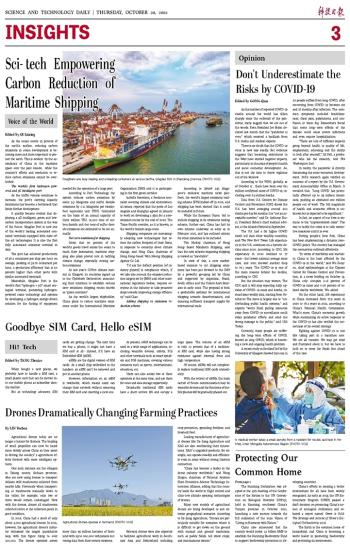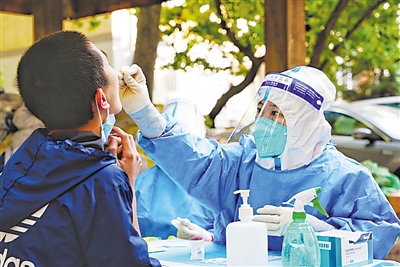
 |
| A medical worker takes a swab sample from a resident for nucleic acid test in Hohhot, Inner Mongolia Autonomous Region. (PHOTO: VCG) |
As the number of reported COVID-19 deaths around the world has fallen sharply since the outbreak of the pandemic, many suggest that we are out of the woods. Even President Joe Biden declared last month that the "pandemic is over," which received a backlash from U.S. media and medical experts.
There is no doubt that the COVID-19 virus is now less deadly. But evidence suggests that loosening restrictions in the West have exerted negative impacts, particularly in the areas of people's health and socio-economic development. So, this is not the time to throw vigilance out of the window.
According to the WHO, globally, as of October 17 , there have been over 621 million confirmed cases of COVID-19, including over 6.5 million deaths.
Data from U.S. Centers for Disease Control and Prevention (CDC) shows the U.S. has been averaging around 400 deaths per day for months. It is "not an acceptable number," said Dr. Anthony Fauci, President Biden's chief medical advisor, at the Atlantic Festival in September.
The U.S. had a far higher COVID death toll than other wealthy countries, said The New York Times. Life expectancy in the U.S. continues on a historic decline since 2020. According to CDC, life expectancy in 2020 declined to 77 years - the lowest national average since 1996, and 2021 showed another drop to 76.1 years. The COVID-19 is one of the main reasons behind the decline, according to CDC.
But the situation may worsen. The CDC said it will stop reporting daily updates of COVID-19 cases and deaths, instead issue weekly data, starting from October 20. The move is largely due to "underfunding public health systems," and experts "worry [that] pulling resources away from COVID-19 surveillance could delay pandemic efforts and send the wrong message to the public," said USA Today.
Currently, many people are suffering the long-term effects of COVID, known as long COVID, which is becoming a new and ongoing health problem.
A recent study in Scotland led by the University of Glasgow showed that one in 20 people suffers from long COVID, after recovering from COVID-19 between six and 18 months after infection. The common symptoms included breathlessness, chest pain, palpitations, and confusion or brain fog. Researchers found that some long-term effects of the disease could cause severe infections and even require hospitalization.
"There are lots of different impacts going beyond health to quality of life, employment, schooling and the ability to look after yourself," Jill Pell, a professor who led the research, told The Washington Post.
In reality, the pandemic is directly threatening the socio-economic development. Pell's research again verified an outcome of a report by the U.S. Government Accountability Office in March. It revealed that, "Long COVID has potentially affected up to 23 million Americans, pushing an estimated one million people out of work. The full magnitude of health and economic effects is unknown but is expected to be significant."
In fact, no aspect of our lives is immune to the "unprecedented crisis". The way to tackle the crisis is to take restrictive measures until it is over.
Putting people's lives first, China has been implementing a dynamic zero-COVID policy. The country has managed the coronavirus outbreak effectively.
"In terms of morbidity and mortality, China is the least affected by the COVID-19 in the world," said Wu Zunyou, chief epidemiologist at the Chinese Center for Disease Control and Prevention, at a news briefing on October 13. China only occupies 0.16 percent of COVID-19 cases and 0.08 percent of related deaths worldwide, Wu added.
On the other hand, life expectancy in China increased from 77.9 years in 2020 to 78.2 years in 2021, according to China's National Health Commission. What's more, China's economic growth while maintaining its active response to the COVID-19 has also verified the correctness of its overall strategy.
Fighting against COVID-19 is just like taking part in a marathon race. We are all runners. We may get tired and frustrated about it, but we have to hold on to cross the finish line ahead of the race.


 Next
Next




